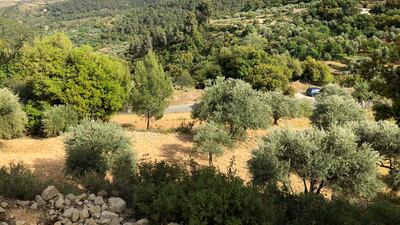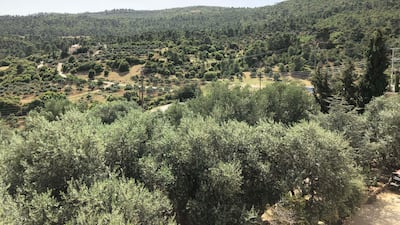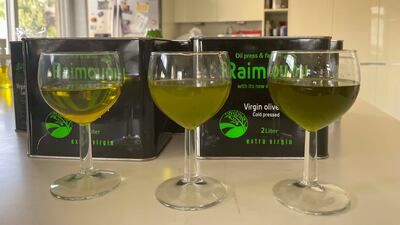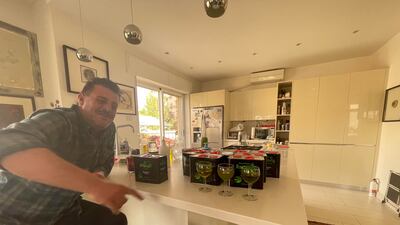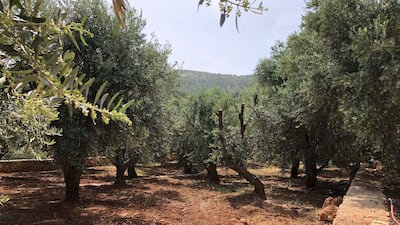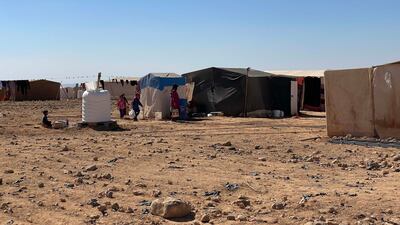Syrian refugee workers pick olives in the north-eastern plains of Jordan and load them on to lorries that take the crop to Israel, where it is pressed for oil.
“It fetches more money there,” says a Jordanian manager of a 16,000-tree farm in the area of Umm Jimal, a few kilometres from the ruins of a Roman city built from basalt near the border with Syria.
A lot of trees in the area are irrigated from illegal water wells as deep as 500 metres, which require large electricity generation capacity to run, raising cost of production as olive demand from Israel feeds the industry.
But Jordan's most prized olive oil does not come from Umm Jimal. That distinction belongs to the bael, or rain-fed, olive groves near the cities of Jerash and Irbid in the north-west. The soil in these regions also tends to be redder.
Income per person per year is $4,100 in Jordan and the country of 10 million people is parched.
Many households, however, are picky when it comes to olive oil, preferring to buy it in 20-litre containers from family farms — whose owners they have known for generations — rather than from the supermarket.

An influx of expatriate money in the 1990s prompted land purchases in outlaying areas and many well-to-do people planted their newly acquired property with olive trees.
Youssef Al Zubi, a farmer from the village of Ketteh near Jerash, manages about 400 olive trees on behalf of land owners in neighbouring Dibbeen, one of few areas in Jordan with natural forest cover.
Last week, Youssef started picking the olive trees adjoining the forest, mostly hiring his extended family. He took the crop to two presses in Jerash governorate. One has Italian machinery, the other German.
The Italian press process the olives at 35°C and the oil turns out to be cloudy green and aromatic.
The German press operates at 15°C and the green oil that comes out is more pure and tastes sharper, though it requires 8 per cent more olives to produce the same amount, partly because the fruits were pressed at lower temperature.

"The quality of the press matters," says Youssef, predicting that the German pressed oil will preserve its taste and colour longer.
Youssef also had some oil from last year. It had turned yellow but still had a distinctive aroma.
The olives are souri baladi (home-grown Levantine), as opposed to the nabali variety grown in Mafraq and in other industrial-scale farms in Jordan.
The baladi variety is more sensitive to temperature and climate. Unseasonal rain in April has harmed the crop and 20 litres of souri baladi oil is selling at $140 this year, compared with $100 last year.
In 2020, prices dropped to $70 per 20 litres, partly because rain came at the right time and was plentiful, resulting in soaring supply.
"Supply is tight this year and whatever we are picking is selling immediately after it is pressed," says Youssef, referring to the baladi variety in Dibbeen.

The Agriculture Ministry expects Jordan's overall olive oil production to rise 20 per cent this year to 28,000 tonnes. Most of the production will be consumed locally as exports remain very small.
But one container of Dibbeen olive oil travelled by service taxi to Beirut via Syria this week, destined for a senior Lebanese engineer introduced to the oil on a personal visit to Jordan two months ago.
"Something tends to be not right in Lebanese olive oil," the engineer says.
Jordan's output is still a fraction of big olive oil producing countries, such as Tunisia, Italy and Greece, or even the 165,000 tonnes produced in Syria in 2010, the last year before the revolt against five decades of Assad family rule.
Mustafa Walid, a Syrian aid worker from Idlib, a region in northern Syria famous for its olive oil, tasted this year's output from Dibbeen and said it was "90 per cent as good is Idlib's oil."
"Ours has a bit more body and is a little sharper," says Mustafa. "But Dibbeen's olive oil is really good."
